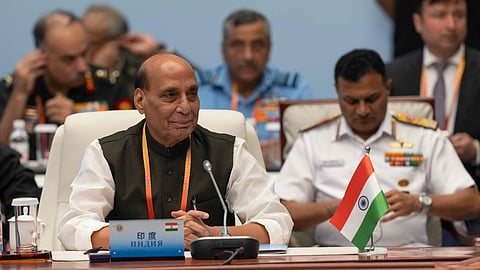

Defence Minister Rajnath Singh reiterated India’s firm stand against cross‑border terrorism during the Shanghai Cooperation Organisation (SCO) Defence Ministers’ gathering, stressing that “peace and prosperity cannot coexist with terror,” and calling for decisive action against state‑sponsored militancy.
He urged the SCO members to align in their fight against terror to ensure regional safety and stability.
“We must unite in our fight against terrorism for our collective safety and security.”
Without naming specific countries, Singh took aim at those who employ terror as a strategic tool. “Some countries use cross-border terrorism as an instrument of policy and provide shelter to terrorists,” he said, adding that such behavior must come with consequences.
“It is imperative that those who sponsor, nurture, and utilize terrorism for their narrow and selfish ends must bear the consequences.”
In a veiled reference to Pakistan, Singh higlighted the recent Pahalgam terror attack, noting that its execution closely resembled previous operations carried out by Lashkar-e-Taiba, a Pakistan-based terror group.
“The pattern of the Pahalgam attack matched Lashkar-e-Taiba’s past strikes in India,” he said, reinforcing India’s long-standing concern over cross-border militancy.
Singh also called out the international community's inconsistent approach toward terrorism: “There should be no place for double standards in combating terrorism. The SCO should not hesitate to criticise nations indulging in such duplicity.”
He reaffirmed India's unwavering stance against terrorism, stating that India is following a policy of zero tolerance towards terrorism.
He emphasised the urgent need for collective global action, declaring that there is a need to hold perpetrators, organisers, financiers and sponsors of terrorism accountable.
Singh further stressed that any acts of terrorism are criminal and unjustifiable regardless of their motivation, calling on the international community to unite in condemning and combating terrorism in all its forms.
(With inputs from PTI)